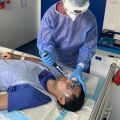Prior COVID-19 infection offers protection from re-infection for at least six months
20 November 2020
A new study suggests that individuals who have previously had COVID-19 are highly unlikely to contract the illness again, for at least six months following their first infection. The study, done as part of a major collaboration between the University of Oxford and Oxford University Hospitals (OUH) NHS Foundation Trust, was published today as a pre-print.
Despite an estimated 51 million people infected with the virus worldwide, with high levels of transmission ongoing, reports of patients becoming re-infected after already having had COVID-19 are rare. However, up until now there have not been any large-scale studies of how much protection from re-infection people get after COVID-19.
The study, part of a major ongoing staff testing programme supported by the NIHR Oxford Biomedical Research Centre and Public Health England, covered a 30-week period (April – November 2020) with 12,180 health care workers employed at OUH. The health care workers were tested for antibodies to the virus that causes COVID-19 as a way of detecting who had been infected before. The hospital tested staff regularly for COVID-19, both when they became unwell with symptoms and also as part of regular testing of well staff. The researchers then followed whether staff who had been infected before had the same number of new COVID-19 infections as those who had not been infected before.
During the study, 89 of 11,052 staff without antibodies developed a new infection with symptoms. None of the 1246 staff with antibodies developed a symptomatic infection. Staff with antibodies were also less likely to test positive for COVID-19 without symptoms, 76 staff without antibodies tested positive compared to just 3 with antibodies. The three healthcare workers with antibodies who tested positive for the virus that causes COVID-19 were all well and did not develop symptoms of COVID-19 again.
This suggests that most people are unlikely to get COVID-19 again if they have already had it in the previous six months. Additionally, the opposite also proved true – health care workers who did not have antibodies against COVID-19 were more likely to develop the infection.
One of the authors on the paper, Professor David Eyre of the University of Oxford's Nuffield Department of Population Health, said: “This ongoing study involving a large cohort of healthcare workers has shown that being infected with COVID-19 does offer protection against re-infection for most people for at least six months – we found no new symptomatic infections in any of the participants who had tested positive for antibodies, while 89 of those who had tested negative did contract the virus. This is really good news, because we can be confident that, at least in the short term, most people who get COVID-19 won’t get it again.
“We know from a previous study that antibody levels fall over time, but this latest study shows that there is some immunity in those who have been infected. We will continue to follow this cohort of staff carefully to see how long protection lasts and whether previous infection affects the severity of infection if people do get infected again.”
While this is an important step in understanding how COVID-19 immunity may work, it is not enough data at the moment to make a judgement on longer-term protection (beyond six months from the initial infection). The study will continue to collect data, with the goal of verifying how long protection from re-infection might last.
Dr Katie Jeffery, Director of Infection Prevention and Control for Oxford University Hospitals said: “This is an exciting finding, indicating that infection with the virus provides at least short-term protection from re-infection – this news comes in the same month as other encouraging news about COVID vaccines. I would like to thank all our staff who have shown great commitment in attending our clinics for repeated swab and antibody testing in order to keep our patients and each other safe.”
OUH Chief Executive Officer Dr Bruno Holthof said: "Since the outbreak of COVID-19, the Trust and the University have worked closely together to develop highly reliable PCR and antibody testing to support the research and care in the fight against the virus.
“Our comprehensive staff testing programme is revealing a regular stream of valuable information as we try to better understand how to tackle this disease. I’d like to thank all those involved in delivering the programme and the more than 12,000 people who work at our hospitals who have participated.”
Notes to editors:
For questions or interview requests, contact Genevieve Juillet, University of Oxford, [email protected]
Full paper: https://www.medrxiv.org/content/10.1101/2020.11.18.20234369v1
About the University of Oxford
Oxford University has been placed number 1 in the Times Higher Education World University Rankings for the fifth year running, and at the heart of this success is our ground-breaking research and innovation. Oxford is world-famous for research excellence and home to some of the most talented people from across the globe. Our work helps the lives of millions, solving real-world problems through a huge network of partnerships and collaborations. The breadth and interdisciplinary nature of our research sparks imaginative and inventive insights and solutions.
Oxford University Hospitals NHS Foundation Trust (OUH) is one of the largest acute teaching trusts in the UK, with a national and international reputation for the excellence of its services and its role in patient care, teaching and research.
The Trust supports world-leading research programmes in cardiovascular diseases, musculoskeletal disorders, neurological disorders such as Parkinson’s and Alzheimer’s through its designation as one of the UK’s five comprehensive biomedical centres. It works in close partnership with the University of Oxford and is a leading centre for cancer, neurosciences, diabetes, genetics and many other fields. Research themes of particular strength are: cancer, cardiovascular science, diabetes, endocrinology and metabolism, infection and immunology, musculoskeletal science, neuroscience and reproduction and development.
This brings together academic research expertise with clinical teams to translate medical science into better healthcare treatments. Our patients benefit from world-class discovery and innovation supported by the NIHR Oxford Biomedical Research Centre, a partnership between the Trust and the University of Oxford, funded by the National Institute for Health Research.
The Trust employs over 12,000 staff and consists of four hospitals: the Churchill Hospital, John Radcliffe Hospital and Nuffield Orthopaedic Centre in Oxford and the Horton General Hospital in Banbury. On 1 October 2015 the Trust was awarded Foundation status and became Oxford University Hospitals NHS Foundation Trust. www.ouh.nhs.uk
 New algorithm supercharges climate models and could lead to better predictions of future climate change
New algorithm supercharges climate models and could lead to better predictions of future climate change
 New study to improve vaccines and therapeutics development
New study to improve vaccines and therapeutics development
 Dr Ashwin Jainarayanan selected for 2024 Schmidt Science Fellow program
Dr Ashwin Jainarayanan selected for 2024 Schmidt Science Fellow program
 Nature degradation could cause a 12% loss to UK GDP
Nature degradation could cause a 12% loss to UK GDP
 Alok Sharma to join the Oxford Martin School as a Visiting Fellow
Alok Sharma to join the Oxford Martin School as a Visiting Fellow